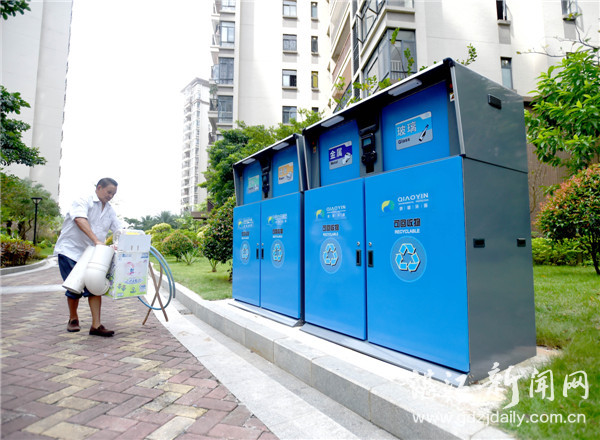Home> News
Zhanjiang promotes household garbage sorting and harmless waste treatment

New waste separation and recycling bins in a residential area of Ruiyun Road in Mazhang district, Zhanjiang. [Photo by Liu Jicheng/gdzjdaily.com.cn]
Zhanjiang in Guangdong province will promote household garbage sorting among local citizens, as a nearly two decade-long planning (2017-2035) regarding household garbage classification recently received approval from the local urban planning authority.
The planning, based on the needs of local residents, includes detailed regulations on household garbage collection, transportation and disposal, solid waste collection, as well as sanitation facilities.
A household waste sorting, collection, transportation, and disposal system is expected to be formed in the city by 2020. Related facilities are expected to be well-equipped. Small waste transfer stations are expected to grow larger in size. The harmless disposal rate of urban solid waste is expected to reach 100 percent, and that in rural areas is expected to reach 90 percent.
Incineration will be the main method of solid waste disposal and landfills serve as the complementary method. The incineration plants in Zhanjiang will be able to dispose 1,500 tons of solid waste per day by 2020.
A new production line capable of disposing 750 tons waste per day will be established, increasing the city's waste treatment capacity to 2,250 tons per day with the aim of meeting the urban area's medium and long-term needs.
A kitchen waste treatment plant, covering an area of 28.5 mu (1.9 hectares), will be built near the incineration plant. It is expected to dispose 200 tons kitchen waste per day including 50 tons of fruit and vegetable waste.
Large-scale markets in districts such as Chikan, Xiashan, Potou, and Mazhang will be equipped with several biochemical processors. Each processor will dispose five to 10 tons of waste per day. In the future, more places will be equipped with such waste treatment facilities.
In rural areas where waste collection and transportation systems are imperfect, methods such as compost treatment and high-temperature fermentation are used to dispose 300 to 500 kg of waste per day.
Recycling stations will be built at local communities, streets, and towns to improve the recycling rate of articles such as metal waste, plastic waste, paper waste, and glass waste. These recyclable materials will be sent to an industrial park, which specializes in the collection, classification, packaging, and trading of waste materials, as well as the disassembly, processing, and tranding of extra-large waste.
The city will optimize the current household waste collection and delivery system. It will promote waste sorting and collection to improve the recycling rate of household garbage, as well as reduce waste incineration and dumping.
It is predicted that 261 tons waste will be reduced per day in Zhanjiang by 2020, 367 tons will be reduced by 2025, and 544 tons will be reduced by 2035.

 Print
Print Mail
Mail 5G construction supports Zhanjiang's high-quality development
5G construction supports Zhanjiang's high-quality development Acting mayor inspects project construction in Xuwen, Leizhou
Acting mayor inspects project construction in Xuwen, Leizhou Zhanjiang island an "egret paradise"
Zhanjiang island an "egret paradise"  Dancing egrets add vitality to Xiashan
Dancing egrets add vitality to Xiashan